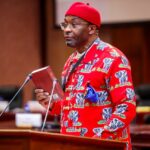A former Minister of Finance, Budget and National Planning, Dr Kalu Idika Kalu, has said that the wrong use of subsidies and corruption modes by past administrations led to failures of the gains in the oil sector.
Kalu said this Monday in Abuja at “Meet and Talk Season 2” with the theme: “Understanding Subsidy (Petroleum) and FOREX policies” organised by Brain Trust Nigeria.
According to him, the wrong use of subsidies that should have been beneficial to the people and the country led to widespread corruption in them.
While describing subsidy as a positive policy, but which the benefits could be used negatively, which was what was being experienced in Nigeria, he said, “In 2014, I said, where you have allowed the wrong use of subsidies to be sustained, that is where corruption comes in. The wrong use of subsidies was sustained over a long time where it affected a sizable proportion of the budget or whatever denominator you want to use.
Stakeholders to Tinubu: Hasty economic reforms worsening poverty
FG stops funding of professional bodies, councils
“Whether it is your revenue, your GDP or your export earnings, while you are using it to subsidise something, you should stop and think about whether you are doing the right thing.
“And the joker in the whole pack; we have never heard it discussed because it is a very technical issue, the exchange rate, which is running so much that domestic prices are dropping or foreign prices are increasing.”
He also faulted the sustained mismanagement of the exchange rate, saying that as long as the naira equivalent of the dollar continued to change so fast, to compensate somebody who imported in dollar terms, the government had to give him the equivalent of the new naira level.
He said, “I have been saying this since 1981, this just does not sink in for the most part. You see, if you spend $8 to import, the next year you are spending $12 to import. Somebody has to give you that differential because the dollar is still the dollar. Then the next time it is $16.
“So, if you have to compensate the guy importing it, you are encouraging him. The government cannot be importing this thing, it is private sector-led. But, the government as an entity knows that the system needs it.
“If the government does not pay the subsidy, then the private sector would, but somebody has to pay for it. Either the government pays a subsidy or the consumer pays the difference. But if you create artificial oligarchies by saying only NNPC can import or whatever can import. It is wrong. You need to leave it to the private sector and they will absorb the increased cost and the consumer pays the difference.”
Kalu also said that the floating of the naira to the forces of demand and supply would be in the interest of the country.
The Central Bank of Nigeria (CBN) unified the exchange rate into the Investors and Exporters (I&E) window on June 14, allowing market forces to determine the exchange rate.
“Fears about floatation leading to total degradation of the naira are not there. It is inefficiency in production, allocation, saving, investment, and allowing the two sides of exchange to function that is the problem, not the act of floating it,” Kalu said.
He noted that leaving the forces of demand and supply to determine the value of the local currency was the right decision.
While saying that the naira would not necessarily remain at the same exchange rate with the dollar forever, he added that without the demand for dollar, the rate would reduce.
He explained that, “For them, once you devalue, you will never revalue. It is always going the other way around. How can anybody say so? In good harvest, the prices will drop. If the suppliers of foreign exchange have just put it at that price, who is going to be buying it? Whoever is buying it is doing so because he can make a profit. If there is nobody buying it, what is going to sustain it there?”
On the petrol subsidy withdrawal, Kalu said there was no way the federal government could have exhaustively addressed the issues before stopping it.

 Join Daily Trust WhatsApp Community For Quick Access To News and Happenings Around You.
Join Daily Trust WhatsApp Community For Quick Access To News and Happenings Around You.


